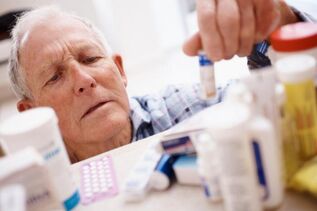Among men with this disease, prostatitis and its treatment are one of the most painful topics. According to experts, the treatment process of prostatitis includes many completely different processes: physical therapy, medication, and massage. Only the full impact of the problem can help eliminate unpleasant symptoms, and most importantly, eliminate the cause of the disease. The main role in this regard is to distribute drugs in the form of tablets, injections and suppositories.

The attending physician selects drugs for treating prostatitis. This set of methods depends on which disease the patient has. Similarly, the type of infection that causes inflammation of the prostate also plays an important role. All doctors pay attention to these two factors first. What else can influence the choice of medicine? We will discuss it later. But first, let us try to figure out what are the problems with male prostatitis and what they need to deal with.
How to understand this is prostatitis?
The treatment of prostatitis cannot be started without complaints from the patient. What signs can indicate that a person is sick? Experts agree that the initial stage of the disease may not show up at all. Weakness and fatigue that occur during the onset of the disease are often mistaken for ordinary fatigue, vitamin deficiency and stress by men. Moreover, only when the inflammation covers the entire prostate can they notice the pain above the pubic bone, radiating to the rectum, difficulty urinating and the constant urge to go to the toilet. With such complaints, patients most often go to polyclinics. At this stage of disease development, pill treatment of prostatitis can achieve good results. The risk of it becoming chronic is small.
However, about 25% of men with prostatitis symptoms do not rush to see a doctor and endure it. In this case, the complaint is much more serious. In addition to constant pain, men also complain of decreased strength, insufficient erection, or rapid ejaculation. In the urine of these patients, fibers, flakes and blood inclusions were visually observed. At this stage, the treatment of prostatitis is a very complicated process.

It is almost impossible to deal with this disease with pills alone. In addition, the risk of complications, such as calculous prostatitis, is also greatly increased.
Causes of prostatitis
What can cause male prostatitis? Treatment (medicine) begins by asking this question. After all, it is the diagnosis made that helps to choose the right medicine for each situation. Young people most often become victims of prostatitis, which develops because they suffer from genital infections: herpes, candidiasis, chlamydia, cytomegalovirus, trichomoniasis, etc. In addition, due to a sedentary lifestyle, regular hypothermia or congestion of the small pelvis can cause inflammation of the prostate.
In mature men, the most common causes of prostatitis are inflammatory diseases of internal organs, stress, purulent inflammatory processes on the skin, and after influenza or other viral infections.
Old people start to suffer from prostatitis due to long-term abstinence. In addition, decreased immunity of internal organs and chronic inflammation process may be the cause of the disease.
Based on these statistical data and laboratory and instrumental research, the doctor chose drugs to treat prostatitis.
Processing method
There are several important aspects in pathological medical treatment. All of these are aimed at restoring prostate tissue, eliminating inflammation and resisting the microorganisms that cause the disease. Symptomatic treatment of male prostatitis is also very important. In this case, medication can relieve pain and cramps.
Eliminating symptoms is not the most important thing to treat prostatitis. Antimicrobial and antiviral drugs used to treat prostatitis are more important. Choose based on the results of laboratory tests. In this case, not only the type of pathogen must be considered, but also the sensitivity of the patient's body to the drug.
What else is needed to eliminate male prostatitis? Treatment (drug therapy) must include taking drugs that restore the immune state. This allows the patient's body to fight infection. In addition, pay attention to restore effectiveness (if there is a problem).
Treatments such as prostate massage, herbs and special nutrition also help restore prostate function.
Types and forms of prostatitis drugs
Therefore, we have found the most effective treatment currently considered. Since drugs for treating prostatitis are considered to be the main means of fighting the disease, it is necessary to consider the most commonly used forms of drugs in more detail:
- Antibiotics and antiviral drugs-tablets, rectal suppositories and injections.
- Alpha 1-blockers-tablet or capsule form.
- Hormone preparation-tablet form for the treatment of prostatitis and prostate adenoma.
- 5-α reductase inhibitor-tablet or capsule.
- Phytopreparations-tablets, capsules with powdered fillers or dragee form.
- Non-steroidal anti-inflammatory drugs-in the form of tablets or injections.
After a thorough examination of the patient, the attending physician decides how to treat prostatitis: pills, injections and/or suppositories.

When a person is diagnosed with prostatitis, which drugs are most commonly used? The names of many drugs are meaningless to most patients, and a single advertisement introduces 2-3 treatments that help fight prostatitis. Next, we will consider each group of drugs for this disease in more detail.
Anti-inflammatory drugs (NSAID)
The prostatitis drugs in this group are designed to relieve pain and inflammation. They can also lower the body temperature of acute prostatitis. The most suitable medicine is:
- Rectal suppositories and diclofenac sodium injection.
- Ketorolac Trimetamo Tablets and Injections.
Both drugs have contraindications. Basically, their intake is reflected in the patient's digestive system. Therefore, in most cases, the treatment plan is a three-day course of treatment with weekly intervals. However, it is recommended to use the drug "Ketorolac" once for high-intensity pain.
Antibiotics and antiviral drugs for prostatitis
Antibiotics and antiviral drugs are brand new drugs for the treatment of prostatitis. The fact is that penicillin and similar substances cannot sufficiently penetrate the prostate barrier and accumulate in the glandular tissue. Therefore, the long-known antibiotics are not effective enough. What drugs can be taken for prostatitis? The following is a list of them:
- Tablets and injections belonging to the protected amoxicillin subgroup, effective for acute and chronic prostatitis.
- A solution of cefotaxime, ceftazidime or ceftriaxone for injection. Although these antibiotics are very effective, they have almost no side effects.
- Azithromycin and Rosamycin, tablets and injections, are related to macrolides. With their help, you can fight the microorganisms in the cells of the diseased organ (namely the prostate).
- Norfloxacin, Ofloxacin or Ciprofloxacin tablets and capsules. In addition to antimicrobial effects, they also produce immunomodulatory effects.
- Ciprofloxacin and Acyclovir tablets are used for patients with prostatitis caused by viral infection.

Therefore, we have listed the main drugs used to treat male prostatitis. Medications can only be selected and prescribed by experts!
Immunity-enhancing preparations
Any inflammatory process (including prostatitis) occurs under the background of reduced immunity. This is why it is important to take immunomodulators. The most effective for prostatitis is:
- Interferon alpha and taktivin tablets can prevent foreign microorganisms;
- Levamisole for T lymphocytes;
- Tablets, containing sodium nucleus, can increase the activity of macrophages;
- The drugs methyluracil and echinacea dried echinacea juice stimulate cellular immunity.
All the above medicines are prescribed by the attending physician. He also calculated the required dose and the duration of the withdrawal of funds. It is not recommended to bring it by yourself!
Herbal medicine for prostatitis
Although there are a lot of synthetic drugs, regular intake of special herbs can reduce the treatment time for prostatitis.
means normal urination
This group of drugs is mainly used for chronic prostatitis. It is this form of disease that indicates problems with urination. Generally, alpha-1 blockers help to relieve swelling of prostate tissue.
The most popular prostatitis treatment
Currently, doctors who specialize in the treatment of male diseases (including prostatitis) are more willing to prescribe complex drugs for patients with multiple characteristics at the same time. For example, prostate extract injection is effective in both acute and chronic prostatitis. Its use helps to activate the immune system and strengthen the blood vessels and cell walls in the prostate. As a result of treatment with this therapy, the blood circulation of the pelvic organs is normalized, and the recovery of prostate tissue is several times faster. Moreover, drugs are usually used in the form of rectal suppositories to treat chronic prostatitis.
Should I take hormones to treat prostatitis?
Hormonal drugs are not used for acute and chronic prostatitis. The only condition a doctor can prescribe hormone-containing drugs is the presence of benign or malignant tumors in the prostate.
Finally, I would like to remind readers again that all the drugs mentioned in this article are prescribed by the attending doctor. Self-management of drugs can lead to unpredictable consequences.
























